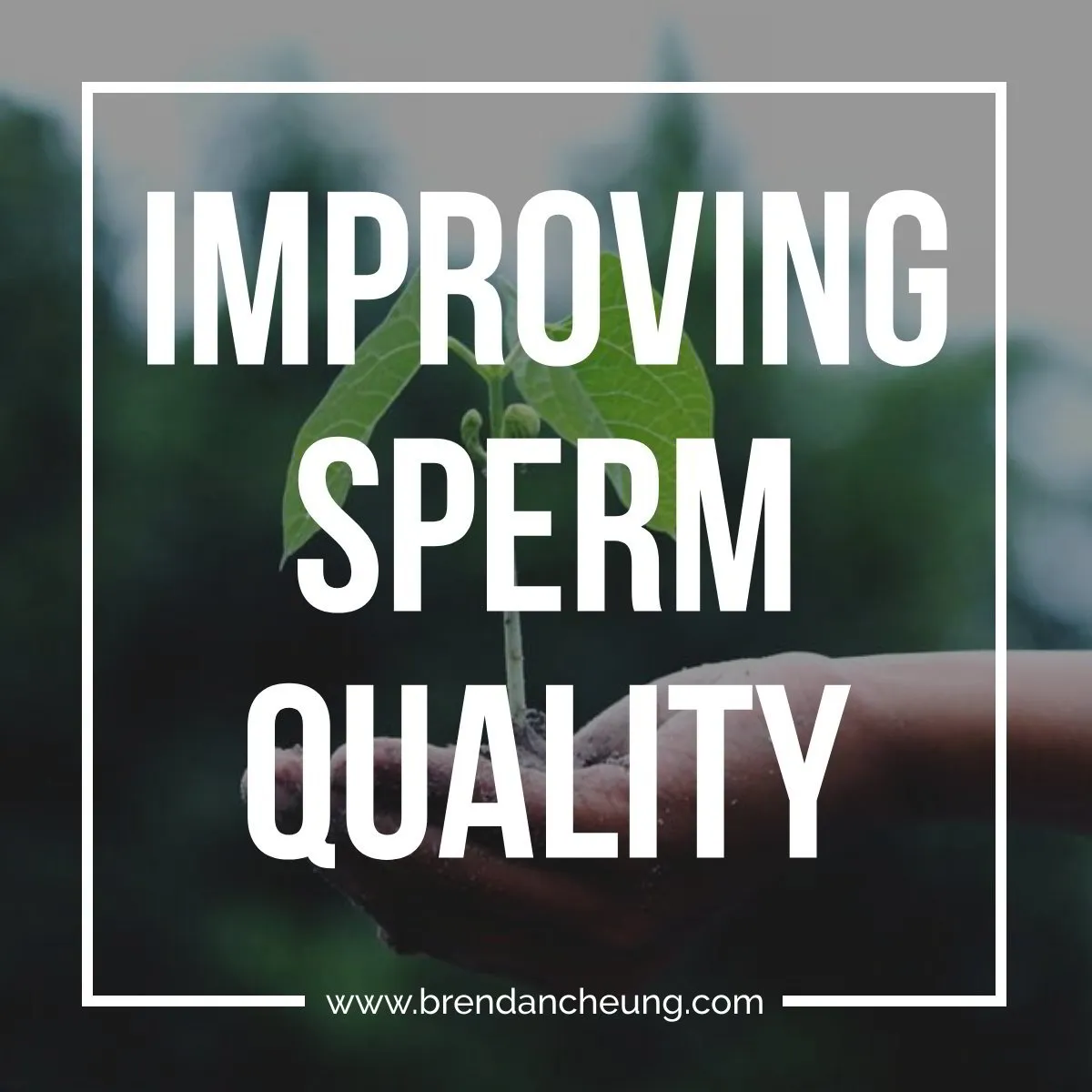Summary
Therapy along with proper lifestyle habits (sleep, diet, activity) can provide a boost in optimizing sperm quality. Be sure to check out the post on improving egg quality as well.
Introduction
Traditional Chinese Medicine (TCM) believes in a holistic approach to care. Lifestyle choices are just as important as getting treatments. I regularly remind patients to be mindful of their diet, their sleeping and their activity levels. Simply put, the healthier you are in general, the better your sperm quality.
Lifestyle
These are the factors that we usually have direct control over, even though changing old habits can be difficult.
Diet is becoming increasingly important as an improper diet will lead to increased inflammation in the whole body. I recommend patients start with limiting (eliminating is ideal) gluten based products, sugars and dairy.
Caffeine is usually not a problem in smaller quantities (one a day should be fine), but a switch to non-caffeinated beverages is even better.
Sleep can be a complex issue, but getting enough sleep and having good sleep habits can boost fertility. Generally, being able to get 8 hours of uninterrupted sleep a night is ideal. Whether it’s going to bed at a certain time, setting a proper sleeping temperature, or using other sleep aids (masks or earplugs), you’ll have to find what works best for you. Not getting enough sleep will cause the body to be stressed.
Activity is another foundation of a health body. This doesn’t mean going to the gym for hours on end or running a marathon. Most of us are sedentary, sitting in front of a computer for work. Gentle moderate activity is the best - make sure it’s part of the routine so you’ll do it regularly. It also helps if it’s something you like to do, so figure out what excites you and it won’t be as hard to be consistent.
Environmental Exposure
The following are potential causes of sperm quality/quantity issues, though as is the case above, we do have some control.
EMF - Electromagnetic field exposure has shown to lower sperm count by creating heat which affects the testicles. Further, Wifi signals can decrease sperm motility and increase sperm DNA fragmentation. Keep the laptop off the lap and the cell phone out of the pockets.
Cigarettes/Alcohol - Smoking affects sperm quality for the obvious reasons. Alcohol in excessive amounts is associated with a decrease in normal sperm counts.
Food Choices - The pesticides on vegetable and fruits as well as the hormones in dairy and meat products can affect hormonal balance. This is where eating organic or good quality meat products (antibiotic/hormone free) can be helpful. Soy products contain phytoestrogens which mimic estrogen functions in the body. Ditto for certain types of plastics, which when heated can release xenohormones.
Supplements
Here are common supplements that are suggested for optimizing sperm health.
1. Zinc and Folic Acid - I put these together as it seems that they work synergistically. A study from a major fertility journal found that a combination of folic acid (5mg) and zinc (66mg) supplements taken daily for 26 weeks increased sperm count by 74%.
Zinc is required in making the membrane and tail of the sperm. Zinc can be found in oysters, beef, lamb, sesame seeds, pumpkin seeds, shrimp, peas. Zinc can be damaged by cooking, so have some of these foods in their raw form.
The best sources of folate is found in romaine lettuce, spinach, asparagus, turnip greens, broccoli, cauliflower, beets, lentils and chicken/calf’s livers. As an aside, folic acid is the synthesized compound found in dietary supplements, as opposed to folate which is form that is found naturally in foods. When considering a supplement, make sure that it is 5-MHTF(5- methyltetrahydrofolate) on the label and not folic acid. Excessive intake of folic acid has been linked to other health issues including colon/prostate cancer.
2. Vitamin C famously associated with oranges has a strong anti-oxidant effect which protects the DNA from damage. Aim for 500mg a day; if taking a multi vitamin that doesn’t provide enough, you can supplement separately to make up the balance. (One study showed 1000mg a day increased sperm counts by 140% and 200mg a day increased counts by 112%). Vitamin C is found in many types of produce including red peppers, broccoli, cranberries, cabbage, potatoes, tomatoes and of course, citrus fruit.
3. Vitamin E is another anti-oxidant and improves the sperm’s ability to penetrate the egg. It is most commonly found in almonds, hazelnuts and vegetable oils (sunflower, wheat germ, safflower, corn). Sunflower seeds and spinach also have vitamin E. Aim for 400IU daily. If supplementing, d-alpha-tocopherol is better than dl-alpha-tocopherol.
4. Selenium is essential for the creation of sperm and low levels directly correlate with low sperm counts. Aim for 55-100 mcg of selenium a day. Selenium is found in brazil nuts, liver, snapper, cod, halibut, tuna, salmon, sardines, shrimp and turkey.
5. Vitamin B12 is involved in cellular replication and deficiencies can lead to reduced sperm count and motility. Supplementation is advised at a rate of 1000mcg per day. B12 can be found in clams, oysters, liver, fish, crab, lobster, beef, lamb, cheese and eggs. Methylcobalamin is the better form of B12 and oral administration at proper levels is as effective as getting a B12 injection.
6. L-Carnitine is important in the energy metabolism of sperm. There is a correlation between the amount of carnitine in seminal fluid and sperm count/ motility. Supplementation at the recommended rate of 1-2mg a day for a minimum of four months is required to see benefits. L-carnitine is usually found in meat and dairy products.
7. CoQ10 works synergistically with L-carnitine and is also involved in energy metabolism. It also functions as an antioxidant protecting the DNA. CoQ10 is not absorbed easily from dietary sources and can be supplemented - 100mg a day is the usual dosage suggested.
8. Vitamin D participates in the development of the nucleus of the sperm cell as well as increasing the levels of testosterone in the body. Aim for 400-800 IU per day. Vitamin D can be found in salmon, and dairy products.
9. Omega 3 FFA are traditionally associated with wild salmon, sardines and herring as well as pumpkin seeds and walnuts. They are essential in membrane formation and reducing oxidative stress. Aim for 1000-5000mg of omega 3’s each day and make sure the source is of good quality (i.e. ow levels of mercury, pesticides).
* Recommended values sourced from NHS, WebMD, Mercola, MayoClinic, and various studies. If interested in reading more, please let me know and I can direct you.
Conclusion
Good lifestyle habits are the foundation for good health and good fertility. For sperm quality specifically, good nutrition possibly with the help of supplementation can yield great results.

